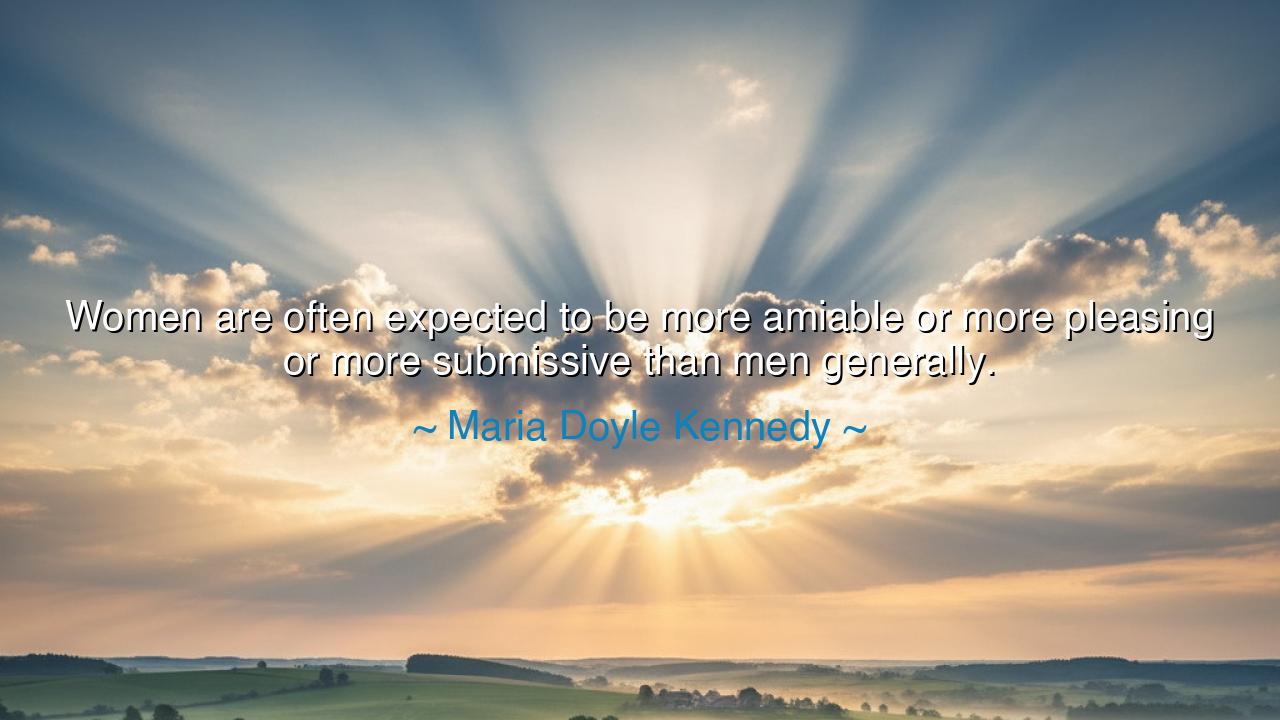
Women are often expected to be more amiable or more pleasing or
Women are often expected to be more amiable or more pleasing or more submissive than men generally.






Hear, O seekers of truth, the words of Maria Doyle Kennedy, spoken with clarity and sorrow: “Women are often expected to be more amiable or more pleasing or more submissive than men generally.” In this saying lies the long shadow of history, the ancient burden laid upon women—to smile when they wished to weep, to yield when they longed to stand, to be gentle even when their spirits burned with fire.
For society has praised amiability in women as though it were their highest virtue, demanding that they soften their voices and hide their anger. They are asked to be pleasing, not for their own joy, but for the comfort of others. And they are pressed into submission, their strength cloaked, their wills diminished, so that the structures of power remain unchallenged. This expectation, taught for centuries, is no accident but a design—one that has silenced countless voices and stifled boundless potential.
Consider the life of Emmeline Pankhurst, leader of the suffragettes in Britain. She was told to be quiet, to be gentle, to be submissive as women had always been. But she refused. She broke the mold of pleasing womanhood and demanded justice. Arrested, beaten, mocked, and despised, she bore the scorn of those who feared change. Yet her defiance helped win the vote for women, proving that the chains of submission could be shattered when courage rose higher than expectation.
The wisdom of Kennedy’s words lies not only in naming the injustice, but in awakening the soul to resist it. To see that the demand for women to always be amiable is not kindness, but control. To recognize that submission is not destiny, but a weight imposed by fear of female power. And to understand that true dignity lies not in pleasing others, but in living fully as one’s self, fierce or gentle, soft or unyielding, as the spirit commands.
Therefore, let this truth endure: women are not vessels for the comfort of others, but sovereign beings with voices, wills, and destinies of their own. The time has come to cast off the old expectations and to honor women not for their submissiveness, but for their strength, their wisdom, and their unshaken fire. For a world that demands submission from its women is a world that cripples itself; but a world that allows them to rise will rise with them.






LNThi lien Nguyen
This quote by Maria Doyle Kennedy really makes me think about the double standards that still exist between men and women. It’s as though society rewards women for being agreeable or submissive, while men are often expected to take charge. Why is this? Are these gendered expectations still widespread, or is there a shift happening that allows women to be more assertive and authentic in both professional and personal spaces?
Ddaophanminhtrung
Kennedy’s quote is a powerful observation about the pressure women face to behave in a certain way. But why do we still hold onto these outdated stereotypes? Is it rooted in tradition, or do we still have subconscious biases about what is 'appropriate' for women? How can we change the narrative and make room for women to express themselves freely without facing judgment or criticism for not being 'amiable' enough?
TLTruong thuy lam
I can definitely relate to Maria Doyle Kennedy’s statement. Women are often held to a different standard than men, especially when it comes to behavior. It makes me wonder: How do we break free from these expectations without being seen as difficult or unapproachable? Why is there such a strong societal preference for women to be pleasing, and what would happen if women just started acting on their own terms without these societal constraints?
MNDai Minh Nhat
Maria Doyle Kennedy’s quote highlights an important and frustrating social expectation placed on women. Why is it that society expects women to be more amiable and submissive compared to men? These gendered expectations can be stifling and unfair. How does this affect women's opportunities or their personal freedom? Is this pressure to conform to certain behaviors slowly shifting, or do we still face these outdated norms in today’s world?